Deck 27: Sources of Magnetic Field
Question
Question
Question
Question
Question
Question
Question
Question
Question
Question
Question
Question
Question
Question
Question
Question
Question
Question
Question
Question
Question
Question
Question
Question
Question
Question
Question
Question
Question
Question
Question
Question
Question
Question
Question
Question
Question
Question
Question
Question
Question
Question
Question
Question
Question
Question
Question
Question
Question
Question
Question

Unlock Deck
Sign up to unlock the cards in this deck!
Unlock Deck
Unlock Deck
1/51
Play
Full screen (f)
Deck 27: Sources of Magnetic Field
1
A horizontal wire carries a current straight toward you. From your point of view, the magnetic field at a point directly below the wire points
A) directly away from you.
B) to the left.
C) to the right.
D) directly toward you.
E) vertically upward.
A) directly away from you.
B) to the left.
C) to the right.
D) directly toward you.
E) vertically upward.
to the right.
2
A very long, solid, conducting cylinder of radius R carries a current along its length uniformly distributed throughout the cylinder. Which one of the graphs shown in the figure most accurately describes the magnitude B of the magnetic field produced by this current as a function of the distance r from the central axis? 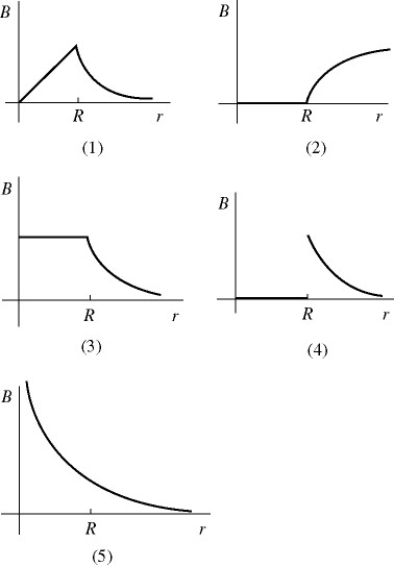
A) 1
B) 2
C) 3
D) 4
E) 5

A) 1
B) 2
C) 3
D) 4
E) 5
1
3
A vertical wire carries a current straight down. To the east of this wire, the magnetic field points
A) toward the north.
B) toward the east.
C) toward the west.
D) toward the south.
E) downward.
A) toward the north.
B) toward the east.
C) toward the west.
D) toward the south.
E) downward.
toward the south.
4
The figure shows two long wires carrying equal currents I1 and I2 flowing in opposite directions. Which of the arrows labeled A through D correctly represents the direction of the magnetic field due to the wires at a point located at an equal distance d from each wire? 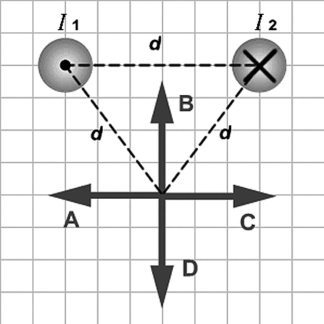
A) A
B) B
C) C
D) D
E) The magnetic field is zero at that point.

A) A
B) B
C) C
D) D
E) The magnetic field is zero at that point.

Unlock Deck
Unlock for access to all 51 flashcards in this deck.
Unlock Deck
k this deck
5
A point charge Q moves on the x-axis in the positive direction with a speed of 280 m/s. A point P is on the y-axis at y = +70 mm. The magnetic field produced at the point P, as the charge moves through the origin, is equal to -0.30 μT  . What is the charge Q? (μ0 = 4π × 10-7 T ∙ m/A)
. What is the charge Q? (μ0 = 4π × 10-7 T ∙ m/A)
A) -53 μC
B) +53 μC
C) -39 μC
D) +39 μC
E) +26 μC
 . What is the charge Q? (μ0 = 4π × 10-7 T ∙ m/A)
. What is the charge Q? (μ0 = 4π × 10-7 T ∙ m/A)A) -53 μC
B) +53 μC
C) -39 μC
D) +39 μC
E) +26 μC

Unlock Deck
Unlock for access to all 51 flashcards in this deck.
Unlock Deck
k this deck
6
Consider a solenoid of length L, N windings, and radius b (L is much longer than b). A current I is flowing through the wire. If the radius of the solenoid were doubled (becoming 2b), and all other quantities remained the same, the magnetic field inside the solenoid would
A) remain the same.
B) become twice as strong.
C) become one half as strong.
A) remain the same.
B) become twice as strong.
C) become one half as strong.

Unlock Deck
Unlock for access to all 51 flashcards in this deck.
Unlock Deck
k this deck
7
A negatively charged particle is moving to the right, directly above a wire having a current flowing to the right, as shown in the figure. In which direction is the magnetic force exerted on the particle? 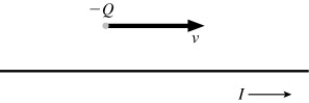
A) into the page
B) out of the page
C) downward
D) upward
E) The magnetic force is zero since the velocity is parallel to the current.

A) into the page
B) out of the page
C) downward
D) upward
E) The magnetic force is zero since the velocity is parallel to the current.

Unlock Deck
Unlock for access to all 51 flashcards in this deck.
Unlock Deck
k this deck
8
Two long parallel wires placed side-by-side on a horizontal table carry identical size currents in opposite directions. The wire on your right carries current toward you, and the wire on your left carries current away from you. From your point of view, the magnetic field at the point exactly midway between the two wires
A) points upward.
B) points downward.
C) points toward you.
D) points away from you.
E) is zero.
A) points upward.
B) points downward.
C) points toward you.
D) points away from you.
E) is zero.

Unlock Deck
Unlock for access to all 51 flashcards in this deck.
Unlock Deck
k this deck
9
A long straight conductor has a constant current flowing to the right. A wire rectangle is situated above the wire, and also has a constant current flowing through it (as shown in the figure). Which of the following statements is true? 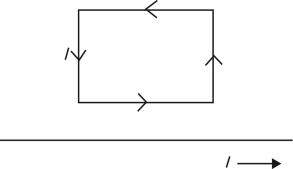
A) The net magnetic force on the wire rectangle is upward, and there is also a net torque on the it.
B) The net magnetic force on the wire rectangle is zero, and the net torque on it is zero.
C) The net magnetic force on the wire rectangle is downward, and there is also a net torque on the it.
D) The net magnetic force on the wire rectangle is zero, but there is a net torque on it.
E) The net magnetic force on the wire rectangle is downward, and the net torque on it is zero.

A) The net magnetic force on the wire rectangle is upward, and there is also a net torque on the it.
B) The net magnetic force on the wire rectangle is zero, and the net torque on it is zero.
C) The net magnetic force on the wire rectangle is downward, and there is also a net torque on the it.
D) The net magnetic force on the wire rectangle is zero, but there is a net torque on it.
E) The net magnetic force on the wire rectangle is downward, and the net torque on it is zero.

Unlock Deck
Unlock for access to all 51 flashcards in this deck.
Unlock Deck
k this deck
10
Two very long parallel wires in the xy-plane, a distance 2a apart, are parallel to the y-axis and carry equal currents I as shown in the figure. The +z direction points perpendicular to the xy-plane in a right-handed coordinate system. If both currents flow in the +y direction, which one of the graphs shown in the figure below best represents the z component of the net magnetic field, in the xy-plane, as a function of x? (Caution: These graphs are not magnetic field lines.) 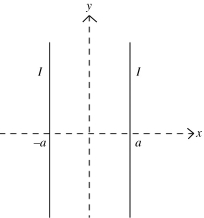
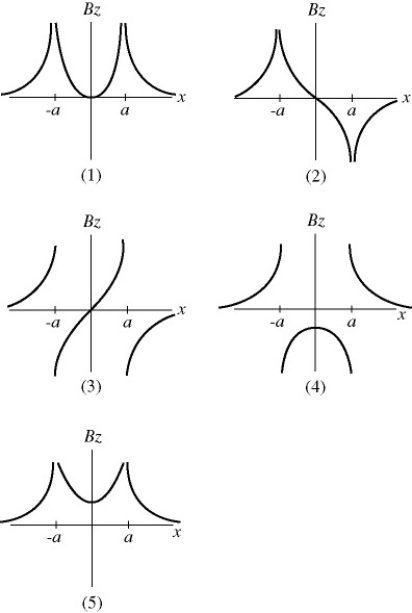
A) 1
B) 2
C) 3
D) 4
E) 5


A) 1
B) 2
C) 3
D) 4
E) 5

Unlock Deck
Unlock for access to all 51 flashcards in this deck.
Unlock Deck
k this deck
11
The figure shows three long, parallel current-carrying wires. The magnitudes of the currents are equal and their directions are indicated in the figure. Which of the arrows drawn near the wire carrying current 1 correctly indicates the direction of the magnetic force acting on that wire? 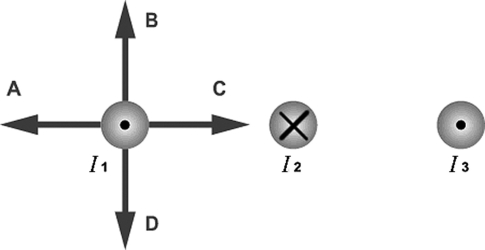
A) A
B) B
C) C
D) D
E) The magnetic force on current 1 is equal to zero.

A) A
B) B
C) C
D) D
E) The magnetic force on current 1 is equal to zero.

Unlock Deck
Unlock for access to all 51 flashcards in this deck.
Unlock Deck
k this deck
12
A point charge Q moves on the x-axis in the positive direction with a speed of 370 m/s. A point P is on the y-axis at y = +80 mm. The magnetic field produced at point P, as the charge moves through the origin, is equal to -0.80 μT  . When the charge is at x = +40 mm, what is the magnitude of the magnetic field at point P? (μ0 = 4π × 10-7 T ∙ m/A)
. When the charge is at x = +40 mm, what is the magnitude of the magnetic field at point P? (μ0 = 4π × 10-7 T ∙ m/A)
A) 0.57 μT
B) 0.74 μT
C) 0.92 μT
D) 1.1 μT
E) 1.3 μT
 . When the charge is at x = +40 mm, what is the magnitude of the magnetic field at point P? (μ0 = 4π × 10-7 T ∙ m/A)
. When the charge is at x = +40 mm, what is the magnitude of the magnetic field at point P? (μ0 = 4π × 10-7 T ∙ m/A)A) 0.57 μT
B) 0.74 μT
C) 0.92 μT
D) 1.1 μT
E) 1.3 μT

Unlock Deck
Unlock for access to all 51 flashcards in this deck.
Unlock Deck
k this deck
13
Two very long parallel wires are a distance d apart and carry equal currents in opposite directions. The locations where the net magnetic field due to these currents is equal to zero are
A) midway between the wires.
B) a distance d/2 to the left of the left wire and also a distance d/2 to the right of the right wire.
C) a distance d to the left of the left wire and also a distance d to the right of the right wire.
D) a distance d/ to the left of the left wire and also a distance d/
to the left of the left wire and also a distance d/
 to the right of the right wire.
to the right of the right wire.
E) The net field is not zero anywhere.
A) midway between the wires.
B) a distance d/2 to the left of the left wire and also a distance d/2 to the right of the right wire.
C) a distance d to the left of the left wire and also a distance d to the right of the right wire.
D) a distance d/
 to the left of the left wire and also a distance d/
to the left of the left wire and also a distance d/ to the right of the right wire.
to the right of the right wire.E) The net field is not zero anywhere.

Unlock Deck
Unlock for access to all 51 flashcards in this deck.
Unlock Deck
k this deck
14
Two very long parallel wires in the xy-plane, a distance 2a apart, are parallel to the y-axis and carry equal currents I as shown in the figure. The +z direction points perpendicular to the xy-plane in a right-handed coordinate system. If the left current flows in the +y direction and the right current flows in the -y direction, which one of the graphs shown in the figure below best represents the z component of the net magnetic field, in the xy-plane, as a function of x? (Caution: These graphs are not magnetic field lines.) 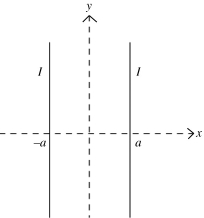
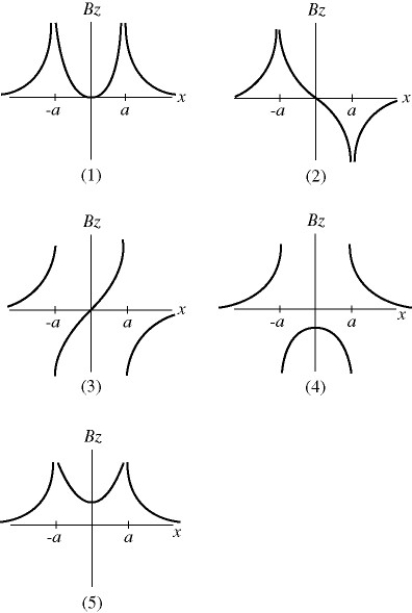
A) 1
B) 2
C) 3
D) 4
E) 5


A) 1
B) 2
C) 3
D) 4
E) 5

Unlock Deck
Unlock for access to all 51 flashcards in this deck.
Unlock Deck
k this deck
15
Consider a solenoid of length L, N windings, and radius b (L is much longer than b). A current I is flowing through the wire. If the length of the solenoid became twice as long (2L), and all other quantities remained the same, the magnetic field inside the solenoid would
A) remain the same.
B) become twice as strong.
C) become one half as strong.
A) remain the same.
B) become twice as strong.
C) become one half as strong.

Unlock Deck
Unlock for access to all 51 flashcards in this deck.
Unlock Deck
k this deck
16
The figure shows three long, parallel, current-carrying wires. The current directions are indicated for currents I1 and I3. The arrow labeled F represents the net magnetic force acting on current I3. The three currents have equal magnitudes. What is the direction of the current I2? 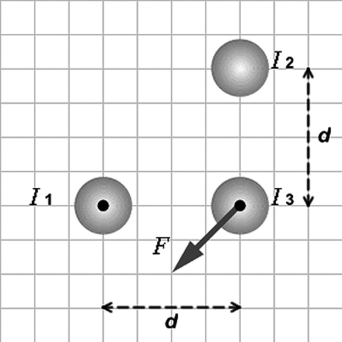
A) into the picture (in the direction opposite to that of I1 and I3)
B) horizontal to the right
C) vertically upward
D) vertically downward
E) out of the picture (in the same direction as I1 and I3)

A) into the picture (in the direction opposite to that of I1 and I3)
B) horizontal to the right
C) vertically upward
D) vertically downward
E) out of the picture (in the same direction as I1 and I3)

Unlock Deck
Unlock for access to all 51 flashcards in this deck.
Unlock Deck
k this deck
17
A ring with a clockwise current (as seen from above the ring) is situated with its center directly above another ring, which has a counter-clockwise current, as shown in the figure. In what direction is the net magnetic force exerted on the top ring? 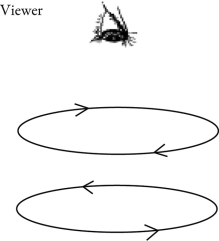
A) upward
B) downward
C) to the right
D) to the left
E) The net force is zero.

A) upward
B) downward
C) to the right
D) to the left
E) The net force is zero.

Unlock Deck
Unlock for access to all 51 flashcards in this deck.
Unlock Deck
k this deck
18
At what distance from the central axis of a long straight thin wire carrying a current of 5.0 A is the magnitude of the magnetic field due to the wire equal to the strength of the Earth's magnetic field of about 5.0 × 10-5 T? (μ0 = 4π × 10-7 T ∙ m/A)
A) 1.0 cm
B) 2.0 cm
C) 3.0 cm
D) 4.0 cm
E) 5.0 cm
A) 1.0 cm
B) 2.0 cm
C) 3.0 cm
D) 4.0 cm
E) 5.0 cm

Unlock Deck
Unlock for access to all 51 flashcards in this deck.
Unlock Deck
k this deck
19
A very long, hollow, thin-walled conducting cylindrical shell (like a pipe) of radius R carries a current along its length uniformly distributed throughout the thin shell. Which one of the graphs shown in the figure most accurately describes the magnitude B of the magnetic field produced by this current as a function of the distance r from the central axis? 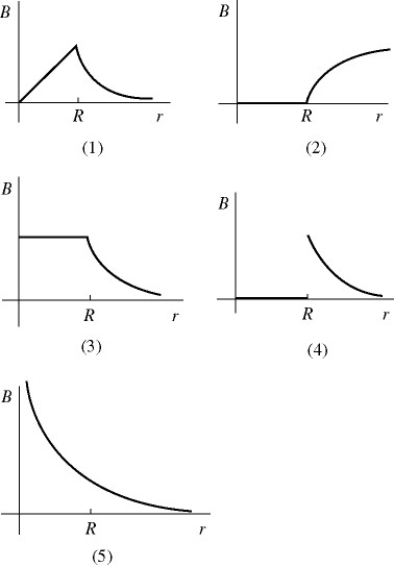
A) 1
B) 2
C) 3
D) 4
E) 5

A) 1
B) 2
C) 3
D) 4
E) 5

Unlock Deck
Unlock for access to all 51 flashcards in this deck.
Unlock Deck
k this deck
20
The figure shows four different sets of insulated wires that cross each other at right angles without actually making electrical contact. The magnitude of the current is the same in all the wires, and the directions of current flow are as indicated. For which (if any) configuration will the magnetic field at the center of the square formed by the wires be equal to zero? 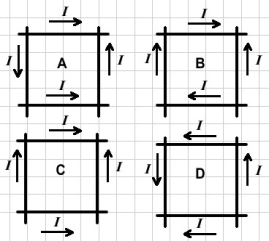
A) A
B) B
C) C
D) D
E) The field is not equal to zero in any of these cases.

A) A
B) B
C) C
D) D
E) The field is not equal to zero in any of these cases.

Unlock Deck
Unlock for access to all 51 flashcards in this deck.
Unlock Deck
k this deck
21
Three very long, straight, parallel wires each carry currents of 4.00 A, directed out of the page as shown in the figure. The wires pass through the vertices of a right isosceles triangle of side 2.00 cm. What is the magnitude of the magnetic field at point P at the midpoint of the hypotenuse of the triangle? 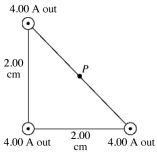
A) 4.42 × 10-6 T
B) 1.77 × 10-5 T
C) 5.66 × 10-5 T
D) 1.26 × 10-4 T
E) 1.77 × 10-6 T

A) 4.42 × 10-6 T
B) 1.77 × 10-5 T
C) 5.66 × 10-5 T
D) 1.26 × 10-4 T
E) 1.77 × 10-6 T

Unlock Deck
Unlock for access to all 51 flashcards in this deck.
Unlock Deck
k this deck
22
A very long straight wire carries a 12-A current eastward and a second very long straight wire carries a 14-A current westward. The wires are parallel to each other and are 42 cm apart. Calculate the force on a 6.4 m length of one of the wires. (μ0 = 4π × 10-7 T ∙ m/A)
A) 8.0 × 10-7 N
B) 5.1 × 10-4 N
C) 8.0 × 10-5 N
D) 5.1 × 10-6 N
E) 2.2 × 10-4 N
A) 8.0 × 10-7 N
B) 5.1 × 10-4 N
C) 8.0 × 10-5 N
D) 5.1 × 10-6 N
E) 2.2 × 10-4 N

Unlock Deck
Unlock for access to all 51 flashcards in this deck.
Unlock Deck
k this deck
23
The figure shows two long, parallel current-carrying wires. The wires carry equal currents I1 = I2 = 20 A in the directions indicated and are located a distance d = 0.5 m apart. Calculate the magnitude and direction of the magnetic field at the point P that is located an equal distance d from each wire. (μ0 = 4π × 10-7 T ∙ m/A) 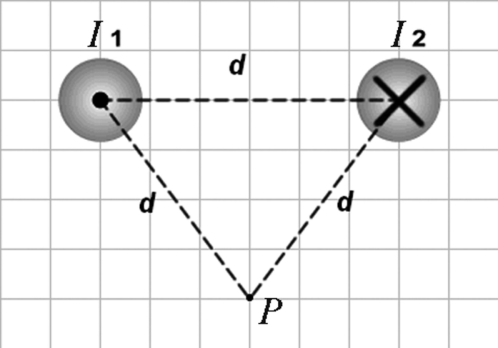
A) 8 µT downward
B) 8 µT upward
C) 4 µT downward
D) 4 µT upward
E) 4 µT to the right

A) 8 µT downward
B) 8 µT upward
C) 4 µT downward
D) 4 µT upward
E) 4 µT to the right

Unlock Deck
Unlock for access to all 51 flashcards in this deck.
Unlock Deck
k this deck
24
Two long parallel wires carry currents of 20 A and 5.0 A in opposite directions. The wires are separated by 0.20 m. What is the magnitude of the magnetic field midway between the two wires? (μ0 = 4π × 10-7 T ∙ m/A)
A) 1.0 × 10-5 T
B) 2.0 × 10-5 T
C) 3.0 × 10-5 T
D) 4.0 × 10-5 T
E) 5.0 × 10-5 T
A) 1.0 × 10-5 T
B) 2.0 × 10-5 T
C) 3.0 × 10-5 T
D) 4.0 × 10-5 T
E) 5.0 × 10-5 T

Unlock Deck
Unlock for access to all 51 flashcards in this deck.
Unlock Deck
k this deck
25
As shown in the figure, a wire is bent into the shape of a tightly closed omega (Ω), with a circular loop of radius 4.0 cm and two long straight sections. The loop is in the xy-plane, with the center at the origin. The straight sections are parallel to the x-axis. The wire carries a 5.0-A current, as shown. What is the magnitude of the magnetic field at the center of the loop? (μ0 = 4π × 10-7 T ∙ m/A) 
A) 25 µT
B) 40 µT
C) 54 µT
D) 80 µT
E) 104 µT

A) 25 µT
B) 40 µT
C) 54 µT
D) 80 µT
E) 104 µT

Unlock Deck
Unlock for access to all 51 flashcards in this deck.
Unlock Deck
k this deck
26
Two long parallel wires carry currents of 10 A in opposite directions. They are separated by 40 cm. What is the magnitude of the magnetic field in the plane of the wires at a point that is 20 cm from one wire and 60 cm from the other? (μ0 = 4π × 10-7 T ∙ m/A)
A) 1.5 µT
B) 3.3 µT
C) 6.7 µT
D) 33 µT
E) 67 µT
A) 1.5 µT
B) 3.3 µT
C) 6.7 µT
D) 33 µT
E) 67 µT

Unlock Deck
Unlock for access to all 51 flashcards in this deck.
Unlock Deck
k this deck
27
A wire carrying a current is shaped in the form of a circular loop of radius 3.0 mm. If the magnetic field strength that this current produces at the center of the loop is 1.1 mT, what is the magnitude of the current that flows through the wire? (μ0 = 4π × 10-7 T ∙ m/A)
A) 5.3 A
B) 16 A
C) 9.1 A
D) 23 A
A) 5.3 A
B) 16 A
C) 9.1 A
D) 23 A

Unlock Deck
Unlock for access to all 51 flashcards in this deck.
Unlock Deck
k this deck
28
As shown in the figure, an insulated wire is bent into a circular loop of radius 6.0 cm and has two long straight sections. The loop is in the xy-plane, with the center at the origin. The straight sections are parallel to the z-axis. The wire carries a current of 8.0 A. What is the magnitude of the magnetic field at the origin? (μ0 = 4π × 10-7 T ∙ m/A) 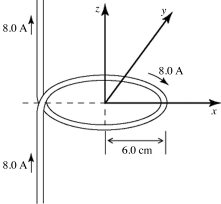
A) 75 µT
B) 81 µT
C) 88 µT
D) 110 µT
E) 120 µT

A) 75 µT
B) 81 µT
C) 88 µT
D) 110 µT
E) 120 µT

Unlock Deck
Unlock for access to all 51 flashcards in this deck.
Unlock Deck
k this deck
29
Two circular coils of diameter 30.0 cm are parallel to each other and have their centers along the same line L but separated by 22.0 cm. When an experimenter views the coils along L, the coil closer to her carries a clockwise current of 2.50 A. Find the magnitude and sense (clockwise or counterclockwise) of the current needed in the other coil so that the net magnetic field on L midway between the two coils will have a magnitude of 4.10 µT and point away from the experimenter who is viewing the coils along L. (μ0 = 4π × 10-7 T ∙ m/A)

Unlock Deck
Unlock for access to all 51 flashcards in this deck.
Unlock Deck
k this deck
30
Two coaxial circular coils of radius R = 15 cm, each carrying 4.0 A in the same direction, are positioned a distance d = 20 cm apart, as shown in the figure. Calculate the magnitude of the magnetic field halfway between the coils along the line connecting their centers. (μ0 = 4π × 10-7 T ∙ m/A) 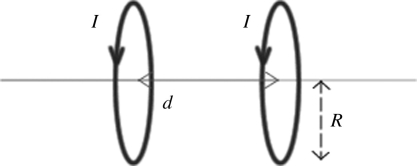
A) 0.90 × 10-5 T
B) 3.9 × 10-5 T
C) 1.9 × 10-5 T
D) 6.3 × 10-5 T
E) 9.2 × 10-5 T

A) 0.90 × 10-5 T
B) 3.9 × 10-5 T
C) 1.9 × 10-5 T
D) 6.3 × 10-5 T
E) 9.2 × 10-5 T

Unlock Deck
Unlock for access to all 51 flashcards in this deck.
Unlock Deck
k this deck
31
A long straight wire on the z-axis carries a current of 6.0 A in the positive direction. A circular loop in the xy-plane, of radius 10 cm, carries a 1.0-A current, as shown in the figure. Point P, at the center of the loop, is 25 cm from the z-axis. An electron is projected from P with a velocity of 1.0 × 106 m/s in the negative x-direction. What is the y component of the force on the electron? (e = 1.60 × 10-19 C, μ0 = 4π × 10-7 T ∙ m/A) 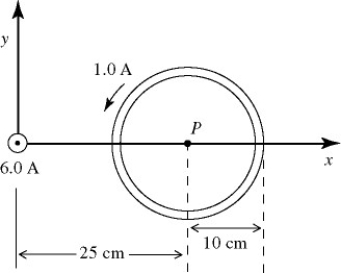
A) -1.0 × 10-18 N
B) +1.0 × 10-18 N
C) -2.0 × 10-18 N
D) +2.0 × 10-18 N
E) zero

A) -1.0 × 10-18 N
B) +1.0 × 10-18 N
C) -2.0 × 10-18 N
D) +2.0 × 10-18 N
E) zero

Unlock Deck
Unlock for access to all 51 flashcards in this deck.
Unlock Deck
k this deck
32
As shown in the figure, two long straight wires are separated by a distance of d = 0.80 m. The currents are I1 = 2.0 A to the right in the upper wire and I2 = 7.0 A to the left in the lower wire. What are the magnitude and direction of the magnetic field at point P, which is a distance d/2 = 0.40 m below the lower wire? (μ0 = 4π × 10-7 T ∙ m/A) 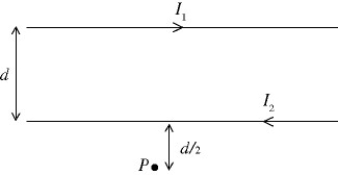


Unlock Deck
Unlock for access to all 51 flashcards in this deck.
Unlock Deck
k this deck
33
A coaxial cable consists of an inner cylindrical conductor of radius R1 = 0.040 m on the axis of an outer hollow cylindrical conductor of inner radius R2 = 0.080 m and outer radius R2 = 0.090 m. The inner conductor carries current I1 = 4.40 A in one direction, and the outer conductor carries current I2 = 7.70 A in the opposite direction. What is the magnitude of the magnetic field at the following distances from the central axis of the cable? (μ0 = 4π × 10-7 T ∙ m/A)
(a) At r = 0.060 m (in the gap midway between the two conductors)
(b) At r = 0.150 m (outside the cable)
(a) At r = 0.060 m (in the gap midway between the two conductors)
(b) At r = 0.150 m (outside the cable)

Unlock Deck
Unlock for access to all 51 flashcards in this deck.
Unlock Deck
k this deck
34
A long straight very thin wire on the y-axis carries a 10-A current in the positive y-direction. A circular loop 0.50 m in radius, also of very thin wire and lying in the yz-plane, carries a 9.0-A current, as shown. Point P is on the positive x-axis, at a distance of 0.50 m from the center of the loop. What is the magnetic field vector at point P due to these two currents? (μ0 = 4π × 10-7 T ∙ m/A) 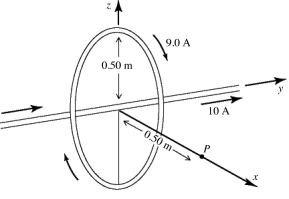
A) zero
B) -8.0 × 10-6 T
C) (+4.0 × 10-6 T) î - (4.0 × 10-6 T)
D) (-4.0 × 10-6 T) î - (4.0 × 10-6 T)
E) (-4.0 × 10-6 T) î - (8.0 × 10-6 T)

A) zero
B) -8.0 × 10-6 T

C) (+4.0 × 10-6 T) î - (4.0 × 10-6 T)

D) (-4.0 × 10-6 T) î - (4.0 × 10-6 T)

E) (-4.0 × 10-6 T) î - (8.0 × 10-6 T)


Unlock Deck
Unlock for access to all 51 flashcards in this deck.
Unlock Deck
k this deck
35
A very long thin wire produces a magnetic field of 0.0050 × 10-4 T at a distance of 3.0 mm. from the central axis of the wire. What is the magnitude of the current in the wire? (μ0 = 4π × 10-7 T ∙ m/A)
A) 7.5 mA
B) 1.7 mA
C) 3300 mA
D) 24,000 mA
A) 7.5 mA
B) 1.7 mA
C) 3300 mA
D) 24,000 mA

Unlock Deck
Unlock for access to all 51 flashcards in this deck.
Unlock Deck
k this deck
36
A circular loop of wire of radius 10 cm carries a current of 6.0 A. What is the magnitude of the magnetic field at the center of the loop? (μ0 = 4π × 10-7 T ∙ m/A)
A) 3.8 × 10-5 T
B) 3.8 × 10-7 T
C) 1.2 × 10-5 T
D) 1.2 × 10-7 T
E) 3.8 × 10-8 T
A) 3.8 × 10-5 T
B) 3.8 × 10-7 T
C) 1.2 × 10-5 T
D) 1.2 × 10-7 T
E) 3.8 × 10-8 T

Unlock Deck
Unlock for access to all 51 flashcards in this deck.
Unlock Deck
k this deck
37
A rectangular loop of wire measures 1.0 m by 1.0 cm. If a 7.0-A current flows through the wire, what is the magnitude of the magnetic force on the centermost 1.0-cm segment of the 1.0-m side of the loop? (μ0 = 4π × 10-7 T ∙ m/A)
A) 9.8 × 10-6 N
B) 7.8 × 10-7 N
C) 9.8 × 10-8 N
D) 4.9 × 10-6 N
A) 9.8 × 10-6 N
B) 7.8 × 10-7 N
C) 9.8 × 10-8 N
D) 4.9 × 10-6 N

Unlock Deck
Unlock for access to all 51 flashcards in this deck.
Unlock Deck
k this deck
38
A type of transmission line for electromagnetic waves consists of two parallel conducting plates (assumed infinite in width) separated by a distance a. Each plate carries the same uniform surface current density of 16.0 A/m, but the currents run in opposite directions. What is the magnitude of the magnetic field between the plates at a point 1.00 mm from one of the plates if a = 0.800 cm? (μ0 = 4π × 10-7 T ∙ m/A)
A) 3.20 × 10-3 T
B) 1.00 × 10-5 T
C) 4.63 × 10-5 T
D) 2.01 × 10-5 T
E) 7.07 × 10-4 T
A) 3.20 × 10-3 T
B) 1.00 × 10-5 T
C) 4.63 × 10-5 T
D) 2.01 × 10-5 T
E) 7.07 × 10-4 T

Unlock Deck
Unlock for access to all 51 flashcards in this deck.
Unlock Deck
k this deck
39
As shown in the figure, a rectangular current loop is carrying current I1 = 3.0 A, in the direction shown, and is located near a long wire carrying a current Iw. The long wire is parallel to the sides of the rectangle. The rectangle loop has length 0.80 m and its sides are 0.10 m and 0.70 m from the wire, as shown. We measure that the net force on the rectangular loop is 4.9 × 10-6 N and is directed towards the wire. (μ0 = 4π × 10-7 T ∙ m/A) 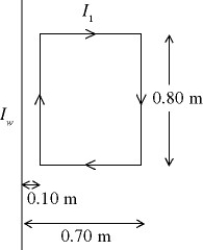
(a) What is the magnitude of the current Iw?
(b) In which direction does Iw flow: from top to bottom or from bottom to top in the sketch?

(a) What is the magnitude of the current Iw?
(b) In which direction does Iw flow: from top to bottom or from bottom to top in the sketch?

Unlock Deck
Unlock for access to all 51 flashcards in this deck.
Unlock Deck
k this deck
40
The magnetic field at a distance of 2 cm from a current carrying wire is 4 μT. What is the magnetic field at a distance of 4 cm from the wire?
A) 1/2 µT
B) 1 µT
C) 2 µT
D) 4 µT
E) 8 µT
A) 1/2 µT
B) 1 µT
C) 2 µT
D) 4 µT
E) 8 µT

Unlock Deck
Unlock for access to all 51 flashcards in this deck.
Unlock Deck
k this deck
41
A long, straight wire with 3.0 A current flowing through it produces magnetic field strength 1.0 T at its surface. If the wire has a radius R, where within the wire is the field strength equal to 36% of the field strength at the surface of the wire? Assume that the current density is uniform throughout the wire. (μ0 = 4π × 10-7 T ∙ m/A)
A) 0.36 R
B) 0.060 R
C) 0.64 R
D) 0.030 R
A) 0.36 R
B) 0.060 R
C) 0.64 R
D) 0.030 R

Unlock Deck
Unlock for access to all 51 flashcards in this deck.
Unlock Deck
k this deck
42
A tube with a 3.0-mm radius has ions flowing through it along its length. To determine the rate at which the charge is being moved through the tube, the magnetic field just outside the tube is measured and found to be 44.0 × 10-4 T. If the only contributor to the magnetic field is the moving ions, and if the walls of the container are very thin and do not screen magnetism, what is the magnitude of the current flowing through the tube? (μ0 = 4π × 10-7 T ∙ m/A)
A) 66 A
B) 132 A
C) 829 A
D) 415 A
A) 66 A
B) 132 A
C) 829 A
D) 415 A

Unlock Deck
Unlock for access to all 51 flashcards in this deck.
Unlock Deck
k this deck
43
A solenoid having N turns and carrying a current of 2.000 A has a length of 34.00 cm. If the magnitude of the magnetic field generated at the center of the solenoid is 9.000 mT, what is the value of N? (μ0 = 4π × 10-7 T ∙ m/A)
A) 860.0
B) 1591
C) 2318
D) 3183
E) 1218
A) 860.0
B) 1591
C) 2318
D) 3183
E) 1218

Unlock Deck
Unlock for access to all 51 flashcards in this deck.
Unlock Deck
k this deck
44
A solenoid is wound with 970 turns on a form 4.0 cm in diameter and 50 cm long. The windings carry a current I in the sense that is shown in the figure. The current produces a magnetic field, of magnitude 4.3 mT, near the center of the solenoid. Find the current in the solenoid windings. (μ0 = 4π × 10-7 T ∙ m/A) 
A) 1.8 A
B) 1.5 A
C) 1.3 A
D) 2.2 A
E) 2.0 A

A) 1.8 A
B) 1.5 A
C) 1.3 A
D) 2.2 A
E) 2.0 A

Unlock Deck
Unlock for access to all 51 flashcards in this deck.
Unlock Deck
k this deck
45
A cylindrical insulated wire of diameter 5.0 mm is tightly wound 200 times around a cylindrical core to form a solenoid with adjacent coils touching each other. When a 0.10 A current is sent through the wire, what is the magnitude of the magnetic field on the axis of the solenoid near its center? (μ0 = 4π × 10-7 T ∙ m/A)
A) 6.6 × 10-5 T
B) 2.5 × 10-5 T
C) 1.3 × 10-5 T
D) 3.6 × 10-5 T
E) 9.8 × 10-5 T
A) 6.6 × 10-5 T
B) 2.5 × 10-5 T
C) 1.3 × 10-5 T
D) 3.6 × 10-5 T
E) 9.8 × 10-5 T

Unlock Deck
Unlock for access to all 51 flashcards in this deck.
Unlock Deck
k this deck
46
A hollow cylinder with an inner radius of 4.0 mm and an outer radius of 30 mm conducts a 3.0-A current flowing parallel to the axis of the cylinder. If the current density is uniform throughout the wire, what is the magnitude of the magnetic field at a point 12 mm from its center? (μ0 = 4π × 10-7 T ∙ m/A)
A) 7.2 × 10-6 T
B) 8.0 × 10-6 T
C) 8.9 × 10-7 T
D) 7.1 × 10-8 T
A) 7.2 × 10-6 T
B) 8.0 × 10-6 T
C) 8.9 × 10-7 T
D) 7.1 × 10-8 T

Unlock Deck
Unlock for access to all 51 flashcards in this deck.
Unlock Deck
k this deck
47
The figure shows the cross-section of a hollow cylinder of inner radius a = 5.0 cm and outer radius b = 7.0 cm. A uniform current density of 1.0 A/ cm2 flows through the cylinder parallel to its axis. Calculate the magnitude of the magnetic field at a distance of d = 10 cm from the axis of the cylinder. (μ0 = 4π × 10-7 T ∙ m/A) 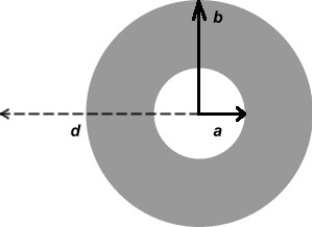
A) 0.00 T
B) 1.5 × 10-4 T
C) 2.5 × 10-4 T
D) 4.5 × 10-4 T
E) 0.50 × 10-4 T

A) 0.00 T
B) 1.5 × 10-4 T
C) 2.5 × 10-4 T
D) 4.5 × 10-4 T
E) 0.50 × 10-4 T

Unlock Deck
Unlock for access to all 51 flashcards in this deck.
Unlock Deck
k this deck
48
A 1000-turn toroidal solenoid has a central radius of 4.2 cm and is carrying a current of 1.7 A. What is the magnitude of the magnetic field inside the solenoid at the central radius? (μ0 = 4π × 10-7 T ∙ m/A)
A) 8.1 mT
B) 51 mT
C) 16 mT
D) 81 mT
E) zero
A) 8.1 mT
B) 51 mT
C) 16 mT
D) 81 mT
E) zero

Unlock Deck
Unlock for access to all 51 flashcards in this deck.
Unlock Deck
k this deck
49
A toroidal solenoid has a central radius of 0.50 m and a cross-sectional diameter of 10 cm. When a current passes through the coil of the solenoid, the magnetic field inside the solenoid at its CENTER has a magnitude of 2.0 μT. What is the largest value of the magnetic field inside the solenoid when this current is flowing? (μ0 = 4π × 10-7 T ∙ m/A)
A) 3.5 µT
B) 1.8 µT
C) 2.2 µT
D) 0.50 µT
E) 2.8 µT
A) 3.5 µT
B) 1.8 µT
C) 2.2 µT
D) 0.50 µT
E) 2.8 µT

Unlock Deck
Unlock for access to all 51 flashcards in this deck.
Unlock Deck
k this deck
50
A solenoid with 400 turns has a radius of 0.040 m and is 40 cm long. If this solenoid carries a current of 12 A, what is the magnitude of the magnetic field near the center of the solenoid? (μ0 = 4π × 10-7 T ∙ m/A)
A) 16 mT
B) 4.9 mT
C) 15 mT
D) 6.0 mT
E) 9.0 mT
A) 16 mT
B) 4.9 mT
C) 15 mT
D) 6.0 mT
E) 9.0 mT

Unlock Deck
Unlock for access to all 51 flashcards in this deck.
Unlock Deck
k this deck
51
A solenoid of length 18 cm consists of closely spaced coils of wire wrapped tightly around a wooden core. The magnetic field strength is 2.0 mT inside the solenoid near its center when a certain current flows through the coils. If the coils of the solenoid are now pulled apart slightly, stretching it to 21 cm without appreciably changing the size of the coils, what does the magnetic field become near the center of the solenoid when the same current flows through the coils? (μ0 = 4π × 10-7 T ∙ m/A)
A) 1.7 mT
B) 3.4 mT
C) 0.85 mT
D) 2.0 mT
A) 1.7 mT
B) 3.4 mT
C) 0.85 mT
D) 2.0 mT

Unlock Deck
Unlock for access to all 51 flashcards in this deck.
Unlock Deck
k this deck


